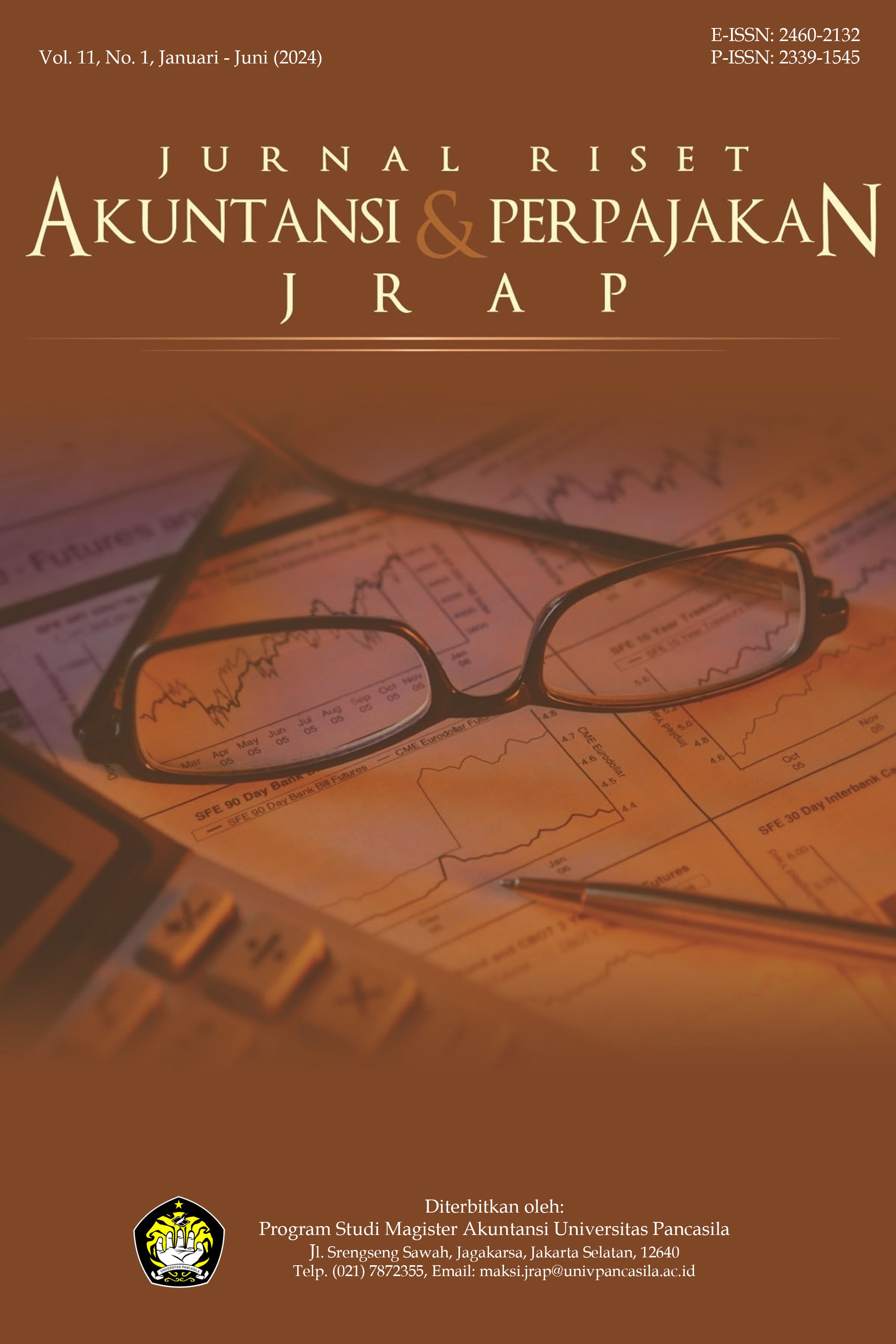Teori Atribusi: Memahami Hubungan Kualitas Layanan, Pemahaman Perpajakan, Implementasi Sanksi dan Kepatuhan Pajak
DOI:
https://doi.org/10.35838/jrap.2024.011.01.13Keywords:
Implementation of Sanctions, Service Quality, Tax Compliance, Tax Understanding LevelAbstract
Tax is a mandatory contribution made by citizens to the government in accordance with the provisions of the law, which is the largest source of income for the state. However, in Indonesia, there are still problems in tax activities, including low tax ratios and low levels of tax compliance. This research aims to investigate the influence of service quality, understanding of taxation, and implementation of sanctions on tax compliance in West Kalimantan Province. The research method used is quantitative with a multiple linear regression analysis approach using the help of the IBM SPSS program in processing the data. Primary data was collected through questionnaires distributed to people who have a Taxpayer Identification Number (NPWP) and regularly report Tax Returns (SPT) to the tax authority. The research results show that service quality does not have a significant effect on tax compliance, while understanding taxation and implementation of sanctions significantly influence tax compliance. The level of tax compliance can be increased by improving service quality, understanding of taxation, and the effectiveness of implementing sanctions. These findings provide valuable insights for tax authorities in improving tax compliance and increasing overall tax revenue.
Downloads
References
Amrul, R., Hidayanti, A. A., & Arifulminan, M. (2020). Pengaruh Pengetahuan, Sanksi, Dan Pelayanan Terhadap Kepatuhan Wajib Pajak Bumi Dan Bangunanan-Perdesaan Dan Perkotaan (PBB-P2) Pada Bapenda Kabupaten Lombok Barat. Jurnal Bisnis, Manajemen, dan Akuntansi, 7(2), 221-241. https://doi.org/10.54131/jbma.v7i2.103
Anggraini, F. D., & Khairunnisa. (2022). Pengaruh Keadilan, Sosialisasi, Dan Sanksi Pajak Terhadap Kepatuhan Wajib Pajak. Jurnal Ilmiah Ekonomi Global Masa Kini, 13(1), 52-58. https://doi.org/10.36982/jiegmk.v13i1.2284
Anjani, S. (2023). Analisis Bibliometric: Pengaruh Covid-19 terhadap Kepatuhan Wajib Pajak dan Penerimaan Pajak. Jurnal Ilmiah Fokus Ekonomi, Manajemen, Bisnis & Akuntansi (EMBA), 2(2), 112-118. https://doi.org/10.34152/emba.v2i01.734
Ariesta, V., & Febriani, E. (2024). Faktor-faktor yang Mempengaruhi Kepatuhan Wajib Pajak Orang Pribadi dengan Sosialisasi Perpajakan sebagai Pemoderasi. Jurnal Buana Akuntansi, 9(1), 1-13. https://doi.org/10.36805/akuntansi.v9i1.6259
Furqon, R. H., Affandi, A., & Suwanda, D. (2022). Strategi Optimalisasi Penilaian Pajak. Cipta Media Nusantara.
Graha, G. A. S., Helpiastuti, S. B., & Widokarti, J. R. (2024). Pengaruh Kesadaran Wajib Pajak dan Pengetahuan Perpajakan Terhadap Kepatuhan Wajib Pajak Orang Pribadi pada KPP Pratama Probolinggo. Jurnal Ilmiah Manajemen Publik Dan Kebijakan Sosial, 8(1), 38-57. https://doi.org/10.25139/jmnegara.v8i1.6934
Heider, F. (1958). The Psychology of Interpersonal Relations (1st ed.). Psychology Press. https://doi.org/10.4324/9780203781159
Hidayat, A. (2022). Faktor-Faktor yang Mempengaruhi Tingkat Kepatuhan Wajib Pajak UMKM di Kota Serang. Petanda: Jurnal Ilmu Komunikasi dan Humaniora, 4(2), 106-121. https://doi.org/10.32509/petanda.v4i2.3320
Undang-undang (UU) Nomor 7 Tahun 2021 tentang Harmonisasi Peraturan Perpajakan, (2021).
Latifah, J., Yeni, F., & Sari, P. I. P. (2024). Determinan Persepsi Mahasiswa Mengenai Penggelapan Pajak dengan Penerapan Teknologi Informasi sebagai Variabel Moderasi. PRIVE: Jurnal Riset Akuntansi Dan Keuangan, 7(1), 1-14. https://doi.org/10.36815/prive.v7i1.3144
Mustika, I. G., Nurfauziah, T., & Yunita, K. (2023). Determinan Pengetahuan Perpajakan, Kualitas Pelayanan Fiskus, Dan Penerapan E-Filling Terhadap Kepatuhan Wp Orang Pribadi. JAAKFE UNTAN (Jurnal Audit dan Akuntansi Fakultas Ekonomi Universitas Tanjungpura), 12(2), 148-161. https://doi.org/10.26418/jaakfe.v12i2.66836
Pebrina, R., & Hidayatulloh, A. (2020). Pengaruh Penerapan E-Spt, Pemahaman Peraturan Perpajakan, Sanksi Perpajakan, Dan Kualitas Pelayanan Terhadap Kepatuhan Wajib Pajak. Jurnal Ilmiah Ekonomi dan Bisnis, 17(1), 1-8. https://doi.org/10.31849/jieb.v17i1.2563
Prianto, E. Y., Ford, A., Albab, M. U., Paramita, A. I., Kinantya, D. A., Latifa, A. P., & Cahyaningsih, D. (2023). Kajian Fiskal Regional Triwulan III Tahun 2023. Retrieved from https://djpb.kemenkeu.go.id/kanwil/kalbar/images/kfr/KFR_Triwulan_III_Tahun_2023_Kalimantan_Barat.pdf
Pujilestari, H., Humairo, M., Amrie, F., & Estralita, T. (2021). Peran Kualitas Pelayanan dalam Kepatuhan Wajib Pajak Orang Pribadi: Sosialisasi Pajak dan Sanksi Pajak. Jurnal Wahana Akuntansi, 16(1), 36-51. https://doi.org/10.21009/wahana.16.013
Rahmatullisa, S., Astuti, M., & Hidayat. (2024). Pelaksanaan Pelayanan Publik diKantor Badan Pengelola Pajak Daerah Kayuagung Kabupaten Ogan Komering Ili. EKOMA : Jurnal Ekonomi, Manajemen, Akuntans, 3(3), 935-945. https://doi.org/10.56799/ekoma.v3i3.3138
Rahmawati, D., & Rustiyaningsih, S. (2021). Pengaruh Kualitas Pelayanan, Sanksi Perpajakan, Biaya Kepatuhan Pajak, Penerapan E-Filling, Dan Kesadaran Wajib Pajak Terhadap Kepatuhan Wajib Pajak. Jurnal Riset Manajemen dan Akuntansi, 9(3), 192-209. https://doi.org/10.33508/jrma.v9i3.1066
Ristiyana, R., Atichasari, A. S., & Indriani, R. (2024). Pengaruh Insentif, Digitalisasi Dan Relawan Pajak Terhadap Kepatuhan Wajib Pajak Dengan Kualitas Pelayanan Sebagai Variabel Moderasi. Owner, 8(2), 1339-1349. https://doi.org/10.33395/owner.v8i2.2096
Rozy, A. F., & Fitri, A. (2023). Analisis Risiko Penerimaan Pajak Negara Pada Laporan APBN 2023 Menggunakan Model Lagrange Quadratic Programming. TAXPEDIA: Journal of Tax Policy, Economic and Accounting, 1(2), 125-135. https://doi.org/10.61261/muctj.v1i2.58
Sonjaya, Y. (2024). Makna Kesadaran Perpajakan dalam Perspektif Fenomenologi. Owner, 8(1), 944-959. https://doi.org/10.33395/owner.v8i1.2149
Supawanhar, S., Ditasman, D., Amrullah, A., Hartono, R., & Silvana, R. J. (2023). Analisis Indeks Kepuasan Masyarakat Dalam Pembuatan Kartu Tanda Penduduk (E-KTP) Online Di Dinas Kependudukan Dan Pencatatan Sipil Kota Bengkulu. EKOMBIS REVIEW: Jurnal Ilmiah Ekonomi Dan Bisnis, 11(2), 1539-1548. https://doi.org/10.37676/ekombis.v11i2.4044
Sutedi, A. (2022). Hukum Pajak. Sinar Grafika.
Winanto, A., Rahman, R. S., Rinaldi, M., Prawiranegara, G. P., Judianto, L., Tampubolon, A. S., Muhtarudin, Bibiana, R. P., Yuliah, A., Suyati, S., Ginting, W., & Suhardi, D. (2024). Perpajakan (Teori Komprehensif). PT. Sonpedia Publishing Indonesia.
Yasa, I. N. P., Martadinata, I. P. H., & Astawa, I. G. P. B. (2019). Peran Theory of Planned Behavior Dan Nilai Kearifan Lokal Terhadap Kepatuhan Wajib Pajak: Sebuah Kajian Eksperimen. EKUITAS (Jurnal Ekonomi dan Keuangan), 3(2), 149-167. https://doi.org/10.24034/j25485024.y2019.v3.i2.4082
Yuliandana, S., Junaidi, & Ramadhan, A. (2021). Pengaruh Tax Avoidance Terhadap Nilai Perusahaan Studi Pada Perusahaan Manufaktur yang Terdaftar Di BEI. Jurnal Ilmiah Akuntansi Kesatuan, 9(1), 31-42. https://doi.org/10.37641/jiakes.v9i1.436
Zulma, G. W. M. (2020). Pengaruh Pengetahuan Wajib Pajak, Administrasi Pajak, Tarif Pajak dan Sanksi Perpajakan terhadap Kepatuhan Pajak Pada Pelaku Usaha UMKM di Indonesia. Ekonomis: Journal of Economics and Business, 4(2), 288-294. https://doi.org/10.33087/ekonomis.v4i2.170
Downloads
Published
Issue
Section
License
Authors who publish with this journal agree to the following terms:
- Authors retain copyright and grant the journal right of first publication with the work simultaneously licensed under a Creative Commons Attribution-ShareAlike 4.0 International License that allows others to share the work with an acknowledgement of the works authorship and initial publication in this journal.
- Authors are able to enter into separate, additional contractual arrangements for the non-exclusive distribution of the journals published version of the work (e.g., post it to an institutional repository or publish it in a book), with an acknowledgement of its initial publication in this journal.
- Authors are permitted and encouraged to post their work online (e.g., in institutional repositories or on their website) prior to and during the submission process, as it can lead to productive exchanges, as well as earlier and greater citation of published work (See The Effect of Open Access).














